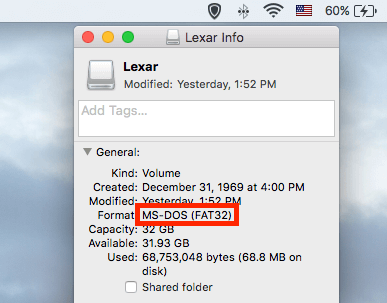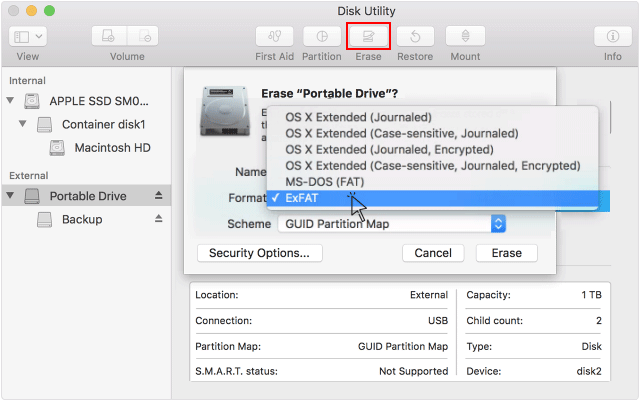
- #FORMATTING EXTERNAL HARD DRIVE FOR MAC AND PC HOW TO#
- #FORMATTING EXTERNAL HARD DRIVE FOR MAC AND PC FOR MAC OS#
- #FORMATTING EXTERNAL HARD DRIVE FOR MAC AND PC MP4#
- #FORMATTING EXTERNAL HARD DRIVE FOR MAC AND PC INSTALL#
- #FORMATTING EXTERNAL HARD DRIVE FOR MAC AND PC PORTABLE#
Windows and macOS can read and write data to ExFAT.
#FORMATTING EXTERNAL HARD DRIVE FOR MAC AND PC INSTALL#
In the same way a fresh install of your OS can solve most issues, reformatting your hard drive is a critical step in troubleshooting problems. Outside of formatting for initial use, you may need to reformat your hard drive if you encounter errors.
#FORMATTING EXTERNAL HARD DRIVE FOR MAC AND PC HOW TO#
In fact, that’s one of our recommended troubleshooting steps in our how to solve an external hard drive not showing up guide. Most external drives come ready to use on your computer, but in rare cases, you’ll need to format your drive. The data isn’t erased completely, but we’ll touch more on that later.

Instead, formatting is used to get the hard drive to a state in which it can be used by the computer, which requires all written data to be erased from the drive. Though that’s true to a degree, it’s not the sole purpose of the process. Most people associate hard drive formatting with erasing a hard drive. Let’s first talk about hard drive formatting, file systems and how formatting doesn’t necessarily erase all data from your drive. We’ll show you how to format your hard drive on Mac and Windows computer operating systems, and explain key settings on both operating systems.īefore getting to that, though, it’s important to understand what hard drive formatting is.
#FORMATTING EXTERNAL HARD DRIVE FOR MAC AND PC PORTABLE#
In this guide on how to format external hard drives, we’re going to help you make sure your portable disk works with everything. It can also be used to prep a hard drive for use with another operating system. Formatting allows you to overwrite all the information on the hard drive, resetting the file structure and how the drive interacts with the operating system. If you’ve run into issues with your hard drive, formatting is one of the first steps you should take to troubleshoot it.
#FORMATTING EXTERNAL HARD DRIVE FOR MAC AND PC MP4#
MP4 Repair: How to Fix Corrupted Video Files in 2019.Best Choice Stellar Phoenix Data Recovery.How to Set Up a Strong Password in 2022.How to Securely Store Passwords in the Cloud.Best Password Manager for Small Business.How to Access the Deep Web and the Dark Net.Online Storage or Online Backup: What's The Difference?.Time Machine vs Arq vs Duplicati vs Cloudberry Backup.Once OS X Fuse and NTFS-3G are installed, your Mac should be able to read and write to NTFS disks just fine.
#FORMATTING EXTERNAL HARD DRIVE FOR MAC AND PC FOR MAC OS#
Follow the instructions to download NTFS-3G for Mac OS X, whose development seems stopped right now but still works in Yosemite. Follow the directions on the OS X Fuse website to download and configure the software. NativeNTFS isn't for rookies: It's a bash script that needs to run from the Terminal command line and requires you to have root (administrator) access to your computer.Īn easier way to go is to download OS X Fuse, a third-party software tool that extends the Mac's file system capabilities.

If you're a DIYer and you'd like to go the free route, you'll find a Sourceforge project called NativeNTFS-OSX that gets the job done.

It includes several additional utilities for people who need to tinker or repair, to enable you to format drives with NTFS, check NTFS partition integrity, fix errors, and more. Paragon Software's NTFS for Mac 12 is another excellent choice. NTFS for Mac costs $31, and you can download a demo first to see how it does. It uses smart caching to keep data transfer as fast as possible and works with every OS X version since 10.4 (Tiger). Tuxera's NTFS for Mac is one of the best ways to do it. Whatever the case, the good news is that it's not a show-stopper: There are a few utilities out there that will enable Macs to write to mounted NTFS volumes.

Maybe the drive you're using has to be used with a PC occasionally. Obviously that solution doesn't work for everyone.


 0 kommentar(er)
0 kommentar(er)
